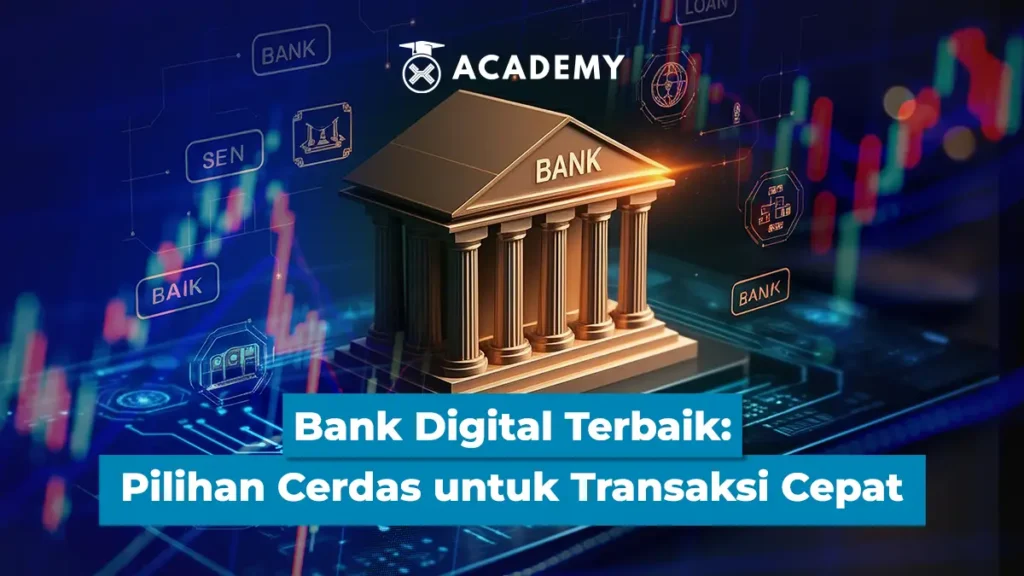Digital banks have brought about a major change in the way people access banking services. Without the need for physical branch offices, banking services can now be accessed more practically through applications or online platforms.
In Indonesia, a number of digital banks have begun implementing blockchain technology to increase efficiency and ensure transparency in operational processes.
This article will comprehensively discuss the definition of a digital bank, its advantages over traditional banks, and how the implementation of blockchain enriches the development of digital banks in Indonesia.
What is a Digital Bank?

Digital banks are a type of banking institution whose entire operations are carried out online without the presence of a physical office.
All forms of services such as opening savings, applying for loans, fund transfer transactions, to investment activities can be easily accessed through applications or official websites.
In general, digital banks are financial institutions that rely on the use of technology in providing banking services.
This transformation is carried out by implementing a comprehensive digital-based financial system to provide a more practical transaction experience for customers.
According to Forbes, the concept of digital banking combines internet banking and mobile banking services in one integrated system.
This allows users to carry out various financial activities anytime and anywhere with just a digital device.
Meanwhile, the Financial Services Authority through Regulation Number 12/POJK.03/2018 explains that digital banking services are a form of banking services that are carried out electronically.
This service allows customers to access information, communicate, and carry out financial transactions without having to come to a physical office.
This system maximizes the use of customer data so that the service process becomes faster, more efficient, according to needs, can be accessed independently, and remains safe.
Currently, it is not only new financial institutions that have been carrying the concept of digital banking from the start.
This is because many banks that have been operating for a long time, both conventional and sharia, have also started to develop digital banking services as an effort to diversify products and innovate in their financial services.
People Also Read This: 5 Global Crypto-Friendly Banks You Must Know
Advantages of Digital Banks Compared to Conventional Banks
Digital banks come with a number of advantages that make them increasingly popular with the public.
Compared to conventional banks, digital banks offer various advantages that make banking activities more practical, efficient, and keep up with technological developments.
The following are some of the advantages of digital banks compared to conventional banks that you need to know:
1. More efficient operational costs
Because they do not have a physical office to manage, digital banks are able to reduce various operational costs. This makes the services they offer to customers more affordable than conventional banks.
2. Ease of access without time and place restrictions
Customers can enjoy banking services anytime and anywhere through digital applications or platforms without having to visit a branch office in person.
3. Fast in adopting the latest technology
Digital banks are usually more agile in utilizing technological developments, such as the use of artificial intelligence (AI) to provide more personalized financial analysis and provide responsive automated customer service.
List of Indonesian Digital Banks
Currently, more and more digital banks are operating in Indonesia, offering various features and conveniences for customers. Here are some digital banks that are active in Indonesia and are the people’s choice:
1. Bank Jago
Bank Jago is a product of PT Bank Jago Tbk, which was established on May 1, 1992 and obtained an operational license on July 10 of the same year.
Initially known as PT Bank Artoz Indonesia, this institution has been running its banking activities since December 12, 1992.
After undergoing rebranding to PT Bank Jago Tbk, this company launched Bank Jago as a digital banking platform to meet the needs of modern society.
2. Blu
Although previously discussed as “Blu,” it should be emphasized that this bank is a separate entity from conventional BCA.
PT Bank Digital BCA is a subsidiary of BCA which was specifically formed to target digital native users.
With features such as bluSaving, bluDeposit, and QRIS integration, blu makes it easy for users to manage their finances independently and flexibly.
3. Jenius
Jenius is a digital banking product from Bank BTPN that has been around since 2016. Jenius’ marketing strategy is quite unique because it targets many public areas that are often visited by the younger generation.
Interestingly, Jenius is already connected to an international payment system, allowing customers to make cross-country transactions directly through the application.
4. Livin
Livin’ by Mandiri is a digital banking service from Bank Mandiri that is designed to make it easier for customers to access various financial products and services through just one application.
Through Livin’, customers can make daily transactions, such as transfers, bill payments, and e-wallet top-ups, without having to go to a branch office.
In addition, this application also allows customers to open accounts, monitor financial recaps, and invest.
The modern interface and complete service integration make Livin’ one of the most popular digital banking platforms in Indonesia.
5. Neo Bank
Neo Bank is here as a digital banking solution from PT Bank Neo Commerce Tbk.
Designed to facilitate transactions from anywhere, including from home, Neo Bank still prioritizes customer data security even though all of its services are online-based.
6. Allo Bank
Allo Bank is a digital service from PT Allo Bank Indonesia Tbk which was officially released in 2022. Previously known as Bank Harda Indonesia, this bank was acquired by Chairul Tanjung before changing to Allo Bank.
Its launch was accompanied by a major promotional event, Allo Bank Festival 2022, which was held in May 2022 and successfully attracted public attention.
7. Line Bank
Line Bank is a collaboration between Line Corporation and a local company, launched on June 10, 2021.
Specifically designed for the younger generation, Line Bank offers easily accessible digital banking services without burdening customers with monthly fees.
8. Motion Banking
Motion Banking is a digital platform from MNC Bank that has been operating since May 2021 under the auspices of PT MNC Kapital Indonesia Tbk, a subsidiary of PT Bank MNC Internasional Tbk.
It is known that Motion Banking offers advanced features such as biometric digital onboarding (fingerprint and facial recognition verification), as well as digital wallet services for cashless transactions, including top-ups and transfers.
9. Bank Raya
Bank Raya, a subsidiary of PT Bank Rakyat Indonesia (BRI), was previously known as Bank Argo. In 2021, this bank officially changed its name to Bank Raya. Their main focus is on digital savings and loan services.
Their flagship product, Pinang, is the first full-service digital loan service that speeds up the disbursement process.
10. D-Save by Danamon
D-Save is a digital product from Bank Danamon that offers a modern banking experience with attractive features such as cash withdrawals without an ATM card.
Other advantages include an initial deposit of IDR 0, as well as free ATM, card, and administration fees, making it a cost-effective and practical solution for new users.
11. Bank Sinarmas
Bank Sinarmas is a bank that has been present in the Indonesian banking industry for quite some time. Now, they are also adapting to the digital era through the SimobiPlus application.
Through this application, customers can open savings, make transfers, pay bills, and even invest in mutual funds without having to come to a branch office.
Easy access and complete features keep Bank Sinarmas relevant amidst the rise of new digital banks.
12. SeaBank
SeaBank is a digital banking service owned by Sea Group, the parent company of Shopee. After officially changing its name from Bank Kesejahteraan Ekonomi, SeaBank offers a fast and completely online account opening process.
Supported by the Shopee ecosystem, SeaBank provides various attractive promos, including cashback and competitive savings interest rates, making it suitable for active e-commerce users.
13. CIMB Niaga Digital (OCTO Mobile & OCTO Clicks)
CIMB Niaga develops its digital services through two main applications, namely OCTO Mobile and OCTO Clicks.
Although not a pure digital bank, this platform offers a variety of complete digital features, such as online account opening, mutual fund investment, to QRIS transactions.
OCTO Mobile provides a digital banking experience that is equivalent to a new digital bank, but with the support of an established large bank infrastructure.
People Also Read This: Smart Ways to Invest in Bank America (BAC) Stocks
Digital Banks Adopting Blockchain Technology
Bank of America (BofA), as the second largest bank in the United States, is now showing strong interest in implementing blockchain technology in its financial services.
One of its breakthrough steps is exploring the possibility of issuing US dollar-based stablecoins.
This was revealed directly by BofA CEO Brian Moynihan, who highlighted a major change in customer interaction patterns.
Currently, around 90 percent of transactions occur digitally, reflecting the high adoption of their banking platform which has been used by more than 40,000,000 people.
Unlike stablecoins such as USDT or USDC issued by crypto-based entities, BofA’s stablecoin has the potential to offer a higher level of security.
This is because the stablecoin is backed by customer account balances, is in a strict banking regulatory system, and has guarantees from an established financial infrastructure.
With this approach, retail and corporate customers can make transactions faster, more efficiently, and at a lower cost without sacrificing the security or trust that has been inherent in conventional banking institutions.
People Also Read: What Is USDC? A Secure & Transparent US Dollar-Based Stablecoin
While the project has great potential, regulatory challenges remain a major stumbling block. Bank of America must meet a number of requirements, including anti-money laundering (AML) and customer identity verification (KYC) requirements.
In addition, they also need to wait for approval from the United States financial authorities. All of these processes are crucial steps before BofA’s stablecoin can be widely used by the public.
Although not a pioneer because JPMorgan has already released JPM Coin for inter-institutional transactions, Bank of America’s approach has a different direction.
Their strategy focuses more on public service, opening up opportunities for stablecoins to be used by the general public.
If successfully launched, this step has the potential to drive the transformation of the global financial system and bridge the traditional financial world with blockchain technology.
Challenges Facing Digital Banks

Despite offering various conveniences, digital banks also face a number of challenges that cannot be ignored. Here are some of the challenges faced by digital banks:
1. Data security
Digital banks have a big responsibility in maintaining the confidentiality and integrity of personal data and user transaction activities.
They must implement a sophisticated protection system to prevent potential data leaks or misuse.
2. Regulations that continue to evolve
Basically, the world of digital banking continues to face legal dynamics that change over time.
Therefore, digital-based financial institutions are required to comply with applicable regulations and actively adapt to new policies implemented by relevant authorities.
Conclusion
Well, that’s an interesting discussion about the Best Digital Banks 2025 that you can read in full only at the Crypto Academy. Not only does it increase your insight into investment, here you can also find the latest crypto news about the world of blockchain and crypto.
In addition, find other latest information packaged in the most complete collection of crypto articles from Indodax Academy. Don’t miss the opportunity to expand your knowledge in the world of investment and digital technology!
So as not to miss the latest information about the crypto world, don’t forget to follow INDODAX’s social media here: Instagram, X, Youtube & Telegram
FAQ
1.What is a digital bank?
A digital bank is a bank that provides online banking services without any physical branches.
2.What is the difference between a digital bank and a conventional bank?
A digital bank operates online, while a conventional bank has physical branches for transactions.
3.How do I open an account at a digital bank?
An account is opened online through the digital bank’s application or website without having to go to a physical branch.
4.Are digital banks safe to use?
Digital banks generally have a strict security system, but it is still important to choose a bank with good regulations and data protection.
5.Are fees at digital banks cheaper?
Yes, because there are no costs for maintaining physical branches, digital banks usually offer lower service fees.





 Polkadot 8.92%
Polkadot 8.92%
 BNB 0.50%
BNB 0.50%
 Solana 4.81%
Solana 4.81%
 Ethereum 2.37%
Ethereum 2.37%
 Cardano 1.35%
Cardano 1.35%
 Polygon Ecosystem Token 2.13%
Polygon Ecosystem Token 2.13%
 Tron 2.85%
Tron 2.85%
 Market
Market


